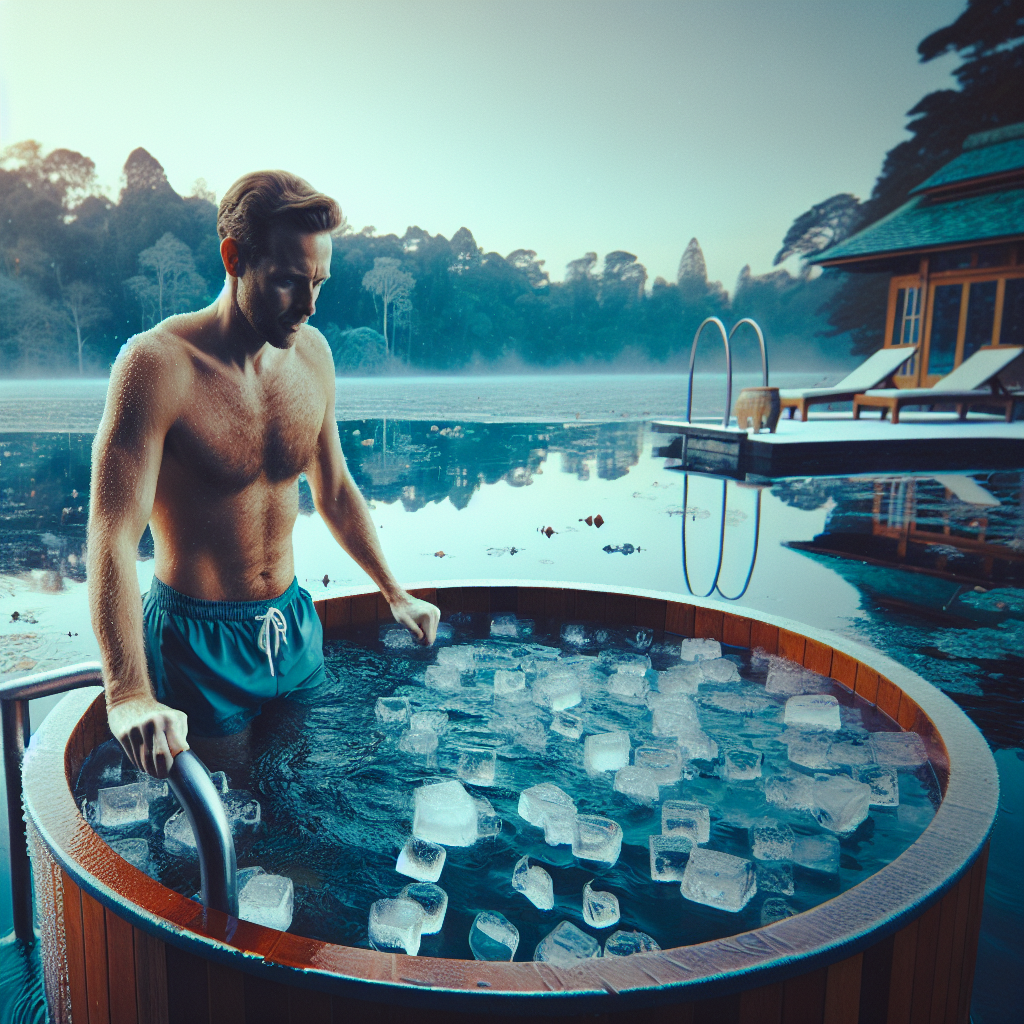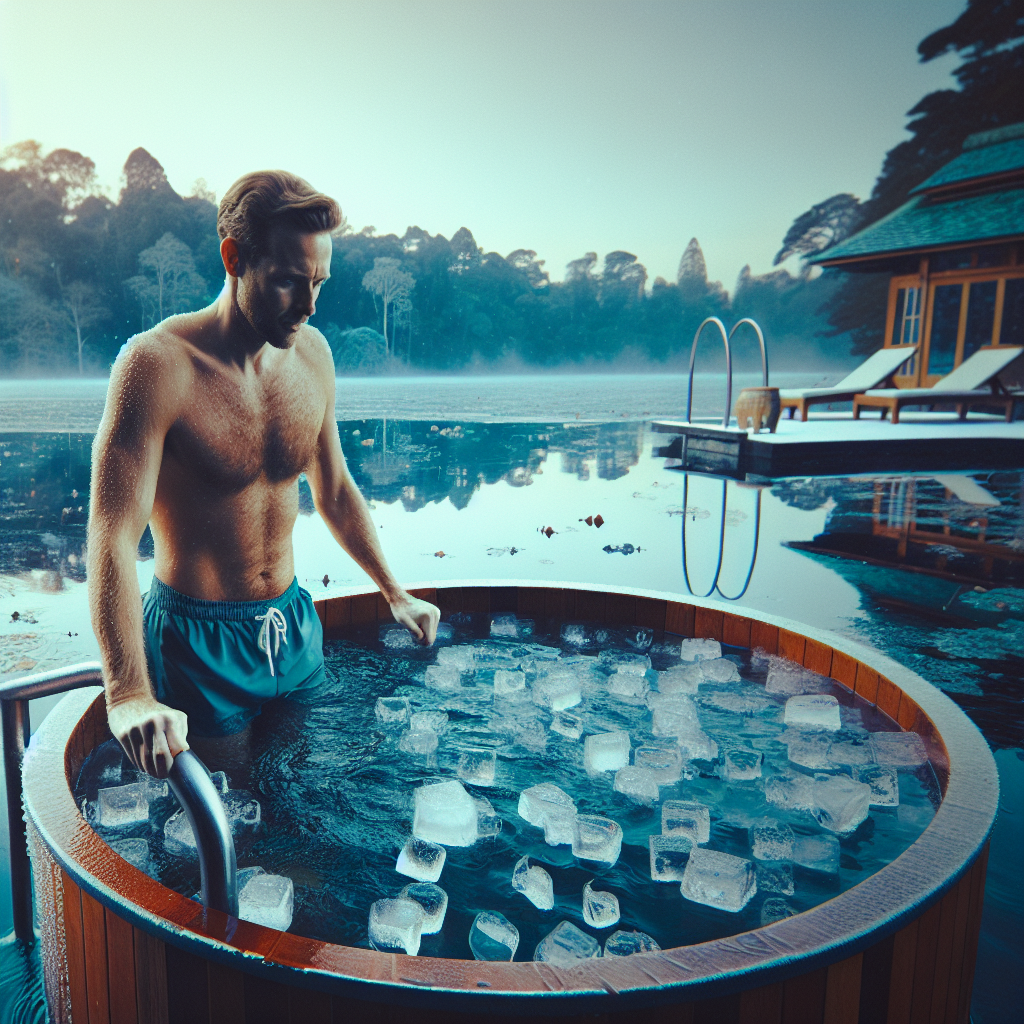When it comes to upgrading your health routine, you may want to consider the benefits of the ice plunge. This chilling yet revitalizing activity has been making waves in wellness circles, lauded for its many health benefits. Edging into a tub filled with icy water may not sound appealing at first, but this article is set to convince you of the myriad health advantages you stand to gain. From revving up metabolism rate to enhancing focus and fitness levels, Ice plunges can be a refreshing and exhilarating addition to your very own health regimen. So, come explore the path less taken, and uncover the intriguing benefits of the ice plunge.

Understanding Ice Plunge Therapy
Ice plunge therapy, also known as cold water immersion, involves submerging your body partially or fully into ice-cold water. This practice, although challenging due to its extreme nature, is purported to bring a host of health benefits. From boosting the immune system to improving circulation, it’s easy to see why this trend is capturing the world’s curiosity.
Origins and Historical Significance
Ice plunge therapy is not a new concept. Its roots can be traced back to ancient cultures, including those of the Romans and the Finnish, who immersed themselves in cold water as part of their bathing rituals. They believed in the healing properties of cold water and used it to alleviate various health conditions. In the world of traditional Chinese medicine, the concept of Yin-Yang balance views the cold as a necessary element to offset excess heat in the body.
Modern Revival and Popularity
In recent years, there has been a resurgence in the interest and popularity of ice plunge therapy. This revival can largely be attributed to Dutch “Iceman” Wim Hof, who has been waving the flag of cold immersion therapy and its associated health benefits. Many health spas and wellness centers now include ice baths as part of their therapy offerings, attesting to their increasing acceptance and popularity.
The Science Behind Cold Exposure
The principle of ice plunge therapy is based on exposing the body to cold temperatures that it would typically not experience in a day-to-day environment. When your body is plunged into ice-cold water, it begins to react in specific ways to maintain its core temperature. This response includes benefits like improved cardiovascular health, enhanced metabolic function, and strengthening of the immune system.
Physiological Effects of Cold Immersion
When you immerse your body in cold water, it triggers processes intended to protect your body from the perceived threat of extreme cold.
Body’s Response to Extreme Cold
When your body is exposed to cold, it responds with a process called thermogenesis to keep your body warm. The shivers you experience are actually your muscles contracting rapidly to generate heat and maintain your body’s core temperature.
Acute and Long-Term Physiological Changes
Acute responses to cold immersion include increased heart rate, respiration and blood pressure. Over time, regular cold exposure can cause physiological adaptations such as increased metabolic rate, which can aid in weight loss and improved cardiovascular function.
Difference Between Ice Plunge and Cryotherapy
While both ice plunge and cryotherapy share the same principle of subjecting the body to extreme cold, they are distinct practices. Ice plunges usually involve immersing the body in cold water. In contrast, cryotherapy usually uses liquid nitrogen to cool a room or enclosed area to very low temperatures, and exposure time is significantly shorter than ice bath immersions.
Boosting the Immune System
Taking regular ice plunges can boost your immune system in various ways.
Activation of Immune Response
Cold exposure causes a stress response, leading to the release of adrenaline and other hormones that can stimulate immune cell production and activity.
Reduction in Inflammation
Cold exposure can reduce inflammation by constraining blood flow and reducing the release of inflammatory substances in the body.
Studies Supporting Immune System Benefits
Many scientific studies report the immune-enhancing effects of regular cold exposure. These include increased white blood cell counts and improved immune cell activity.

Improving Circulation and Cardiovascular Health
Subjecting yourself to cold water can also benefit your cardiovascular system greatly.
Vasoconstriction and Vasodilation
Cold exposure causes vasoconstriction, or the narrowing of blood vessels, which can improve blood circulation by forcing your blood to flow more efficiently to maintain body temperature. Afterwards, vasodilation, or the widening of blood vessels, occurs when you warm up, allowing fresh oxygen and nutrients to reach your cells.
Impact on Blood Pressure and Heart Rate
The initial shock of cold immersion causes an increase in heart rate and blood pressure but with regular practice, your body can adapt and manage these responses better, potentially leading to a decrease in resting heart rate and blood pressure.
Potential for Reducing Heart Disease Risk
By improving blood circulation and heart function, regular cold exposure has the potential to reduce the risk of heart disease, although more research is needed to fully understand these effects.
Enhancing Metabolic Function
Cold immersion can also boost metabolic function and fat burning processes.
Stimulation of Brown Fat Activity
When you’re exposed to cold, your body can stimulate brown fat, a kind of fat that generates heat, in a process called thermogenesis. This fat burning can potentially help manage weight.
Influence on Weight Management
Regular cold exposure may help manage weight due to the increased calorie burning during thermogenesis and the effect of cold on appetite hormones.
Effects on Insulin Sensitivity and Blood Sugar Levels
Some research suggests that cold immersion may improve insulin sensitivity and help regulate blood sugar levels, although the evidence is still emerging.
Mental Health and Cognitive Benefits
The benefits of ice plunge therapy extend to your mental and cognitive health as well.
Elevation of Mood and Energy Levels
Many enthusiasts report boosts in energy levels and moods after an ice plunge. This uplift is due largely to the endorphin rush that kicks in during the cold exposure.
Reduction of Stress and Anxiety
The physical stress of cold exposure can lead to mental stress reduction and tranquillity. It can train the body and mind to better manage stressful situations and may help reduce the symptoms of conditions such as anxiety and depression.
Improvement in Cognitive Function
Cold immersion can also impact cognitive function positively. The increased blood flow can improve brain function and may boost aspects of cognition like focus, memory, and alertness.
Pain Management and Muscle Recovery
Cold immersion can be beneficial for pain management and muscle recovery, particularly for athletes.
Natural Analgesic Effect
The cold has a numbing effect on the body, acting as a natural painkiller. It can help alleviate muscle and joint pain and reduce inflammation.
Reduced Muscle Soreness and Inflammation
For athletes, ice baths can reduce muscle soreness and inflammation post-exercise, helping to speed up recovery time.
Comparison with Conventional Recovery Methods
While there are many conventional recovery techniques like massages and physical therapy, cold immersion offers a different approach. By targeting the whole body, it may provide more comprehensive benefits.
Boosting Athletic Performance
Ice plunges have been popular among athletes for a long time, mainly because of their benefits for recovery and performance.
Enhanced Recovery Post-Exercise
As mentioned earlier, cold immersion can help reduce post-exercise soreness and speed up muscle healing. This faster recovery time means athletes can get back to training sooner.
Increased Endurance and Strength
Over time, regular cold immersion can help improve an athlete’s overall resilience, potentially leading to increased strength and endurance.
Athletes Who Utilize Ice Plunges
Many famous athletes swear by the benefits of ice plunges. Examples include professional basketball and football players, marathon runners, and even Olympic athletes who use ice bath immersion as part of their training and recovery regimen.
Skin and Hair Health
Another surprising but welcome side benefit of ice plunge therapy is its potential to promote healthier skin and hair.
Improved Skin Tone and Tightness
Cold exposure can tighten skin by constricting blood vessels, leading to less swelling and puffiness. It may also help give skin a healthy glow due to improved circulation.
Reduction of Acne and Skin Inflammation
Cold also has anti-inflammatory effects so it could potentially help reduce inflammation-based skin issues such as acne, although more research is needed in this area.
Strengthening of Hair Follicles
Cold water can also benefit your hair by making it shinier and healthier. The cold can constrict the cuticles and pores, strengthening hair follicles and preventing them from getting blocked or damaged.
Scientific Research and Future Outlook
The research on ice plunge therapy, while encouraging, is still evolving.
Overview of Current Studies
Various studies have shown positive effects of cold immersion on the immune system, cardiovascular health, metabolism, mental health, muscle recovery, and even skin and hair. However, many of these studies are preliminary, and more comprehensive research is needed.
Emerging Trends in Ice Plunge Therapy
Ice plunge therapy is an area of growing interest in the fields of health and wellness, and to athletes seeking natural ways to increase performance and recovery.
Potential Developments in Health Applications
In the future, we may see larger studies that robustly quantify the health benefits of cold immersion. As our understanding evolves, it’s likely ice plunge therapy will continue to gain acceptance as a complementary therapy in overall health management.
Plunging into ice-cold water may seem like a daunting challenge, but as you can see, there are plenty of possible health benefits. As with any new therapy, it is important to approach it gradually and safely, taking into consideration your health status. Always seek professional advice before starting a new health practice. But who knows? Maybe your next leap of faith could be a refreshing plunge into ice-cold rejuvenation!
